Mental Health in Singapore: National Priority and Healthcare Models
VerifiedAdded on 2020/05/16
|12
|3364
|3553
Essay
AI Summary
This essay examines the critical importance of mental health as a national priority in Singapore. It highlights the prevalence of mental disorders like anxiety, depression, and drug abuse, emphasizing the impact of socioeconomic factors and the need for effective interventions. The essay delves into the stigma associated with mental illness and its adverse effects on individuals and society. It explores various healthcare models, including the Beveridge and Bismarck models, to propose strategies for improving mental healthcare access and affordability. Furthermore, it advocates for education, awareness campaigns, and government subsidies to address mental health disparities and promote equitable access to resources. The conclusion stresses the necessity of collaborative efforts among healthcare providers, community partners, and government agencies to reduce stigma, encourage help-seeking behavior, and ultimately enhance the mental well-being of Singaporeans.

Running head- WELLBEING
National Health Priority in Singapore
Name of the Student
Name of the University
Author Note
National Health Priority in Singapore
Name of the Student
Name of the University
Author Note
Paraphrase This Document
Need a fresh take? Get an instant paraphrase of this document with our AI Paraphraser
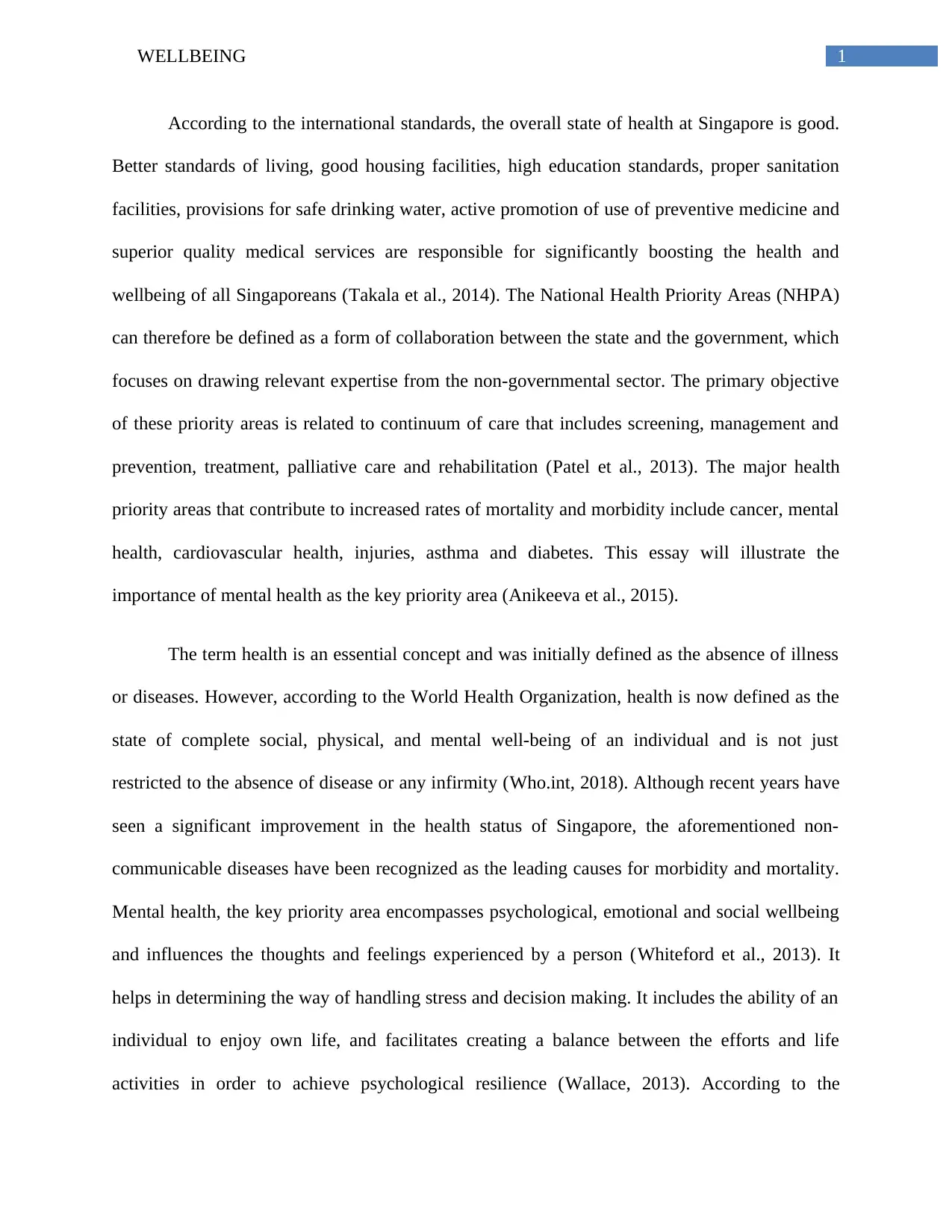
1WELLBEING
According to the international standards, the overall state of health at Singapore is good.
Better standards of living, good housing facilities, high education standards, proper sanitation
facilities, provisions for safe drinking water, active promotion of use of preventive medicine and
superior quality medical services are responsible for significantly boosting the health and
wellbeing of all Singaporeans (Takala et al., 2014). The National Health Priority Areas (NHPA)
can therefore be defined as a form of collaboration between the state and the government, which
focuses on drawing relevant expertise from the non-governmental sector. The primary objective
of these priority areas is related to continuum of care that includes screening, management and
prevention, treatment, palliative care and rehabilitation (Patel et al., 2013). The major health
priority areas that contribute to increased rates of mortality and morbidity include cancer, mental
health, cardiovascular health, injuries, asthma and diabetes. This essay will illustrate the
importance of mental health as the key priority area (Anikeeva et al., 2015).
The term health is an essential concept and was initially defined as the absence of illness
or diseases. However, according to the World Health Organization, health is now defined as the
state of complete social, physical, and mental well-being of an individual and is not just
restricted to the absence of disease or any infirmity (Who.int, 2018). Although recent years have
seen a significant improvement in the health status of Singapore, the aforementioned non-
communicable diseases have been recognized as the leading causes for morbidity and mortality.
Mental health, the key priority area encompasses psychological, emotional and social wellbeing
and influences the thoughts and feelings experienced by a person (Whiteford et al., 2013). It
helps in determining the way of handling stress and decision making. It includes the ability of an
individual to enjoy own life, and facilitates creating a balance between the efforts and life
activities in order to achieve psychological resilience (Wallace, 2013). According to the
According to the international standards, the overall state of health at Singapore is good.
Better standards of living, good housing facilities, high education standards, proper sanitation
facilities, provisions for safe drinking water, active promotion of use of preventive medicine and
superior quality medical services are responsible for significantly boosting the health and
wellbeing of all Singaporeans (Takala et al., 2014). The National Health Priority Areas (NHPA)
can therefore be defined as a form of collaboration between the state and the government, which
focuses on drawing relevant expertise from the non-governmental sector. The primary objective
of these priority areas is related to continuum of care that includes screening, management and
prevention, treatment, palliative care and rehabilitation (Patel et al., 2013). The major health
priority areas that contribute to increased rates of mortality and morbidity include cancer, mental
health, cardiovascular health, injuries, asthma and diabetes. This essay will illustrate the
importance of mental health as the key priority area (Anikeeva et al., 2015).
The term health is an essential concept and was initially defined as the absence of illness
or diseases. However, according to the World Health Organization, health is now defined as the
state of complete social, physical, and mental well-being of an individual and is not just
restricted to the absence of disease or any infirmity (Who.int, 2018). Although recent years have
seen a significant improvement in the health status of Singapore, the aforementioned non-
communicable diseases have been recognized as the leading causes for morbidity and mortality.
Mental health, the key priority area encompasses psychological, emotional and social wellbeing
and influences the thoughts and feelings experienced by a person (Whiteford et al., 2013). It
helps in determining the way of handling stress and decision making. It includes the ability of an
individual to enjoy own life, and facilitates creating a balance between the efforts and life
activities in order to achieve psychological resilience (Wallace, 2013). According to the
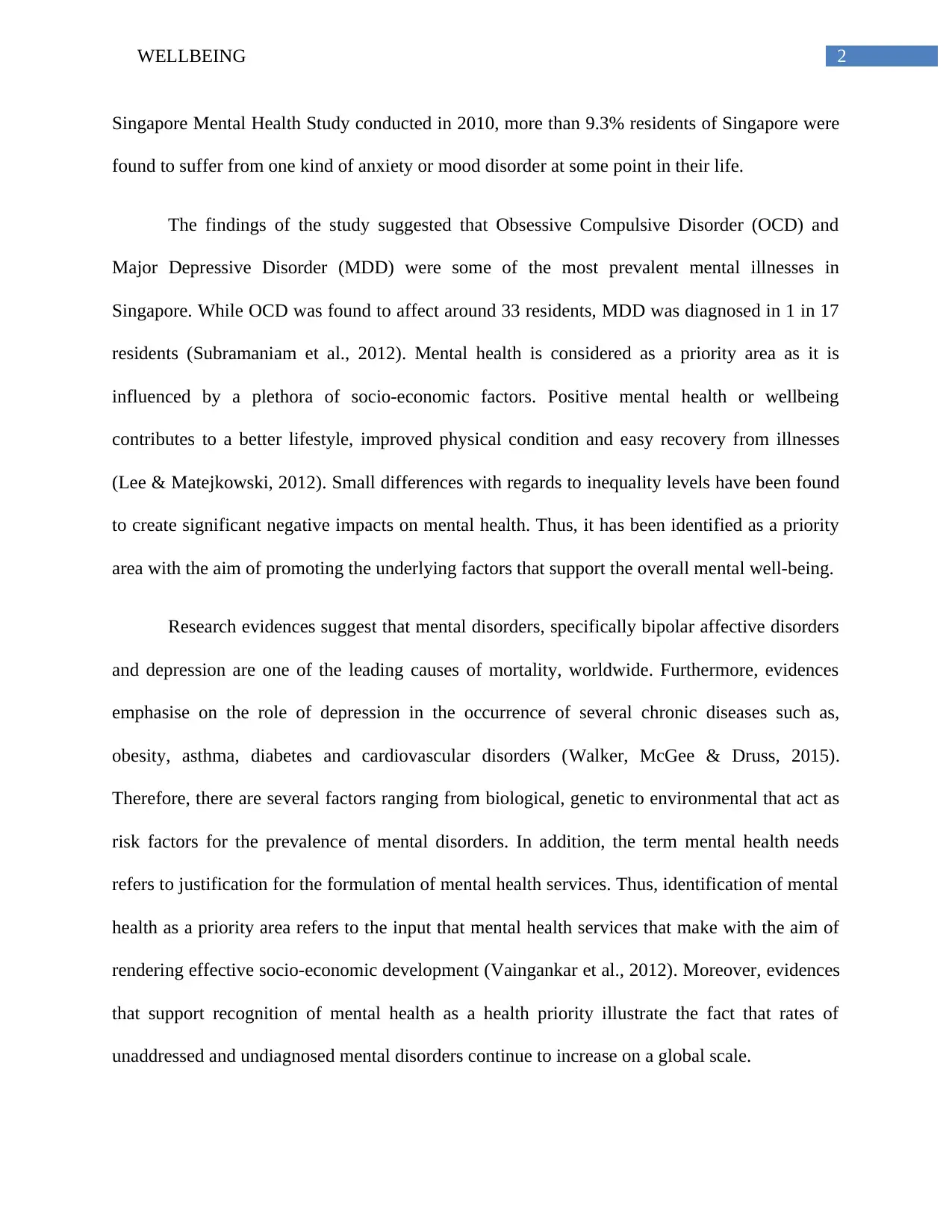
2WELLBEING
Singapore Mental Health Study conducted in 2010, more than 9.3% residents of Singapore were
found to suffer from one kind of anxiety or mood disorder at some point in their life.
The findings of the study suggested that Obsessive Compulsive Disorder (OCD) and
Major Depressive Disorder (MDD) were some of the most prevalent mental illnesses in
Singapore. While OCD was found to affect around 33 residents, MDD was diagnosed in 1 in 17
residents (Subramaniam et al., 2012). Mental health is considered as a priority area as it is
influenced by a plethora of socio-economic factors. Positive mental health or wellbeing
contributes to a better lifestyle, improved physical condition and easy recovery from illnesses
(Lee & Matejkowski, 2012). Small differences with regards to inequality levels have been found
to create significant negative impacts on mental health. Thus, it has been identified as a priority
area with the aim of promoting the underlying factors that support the overall mental well-being.
Research evidences suggest that mental disorders, specifically bipolar affective disorders
and depression are one of the leading causes of mortality, worldwide. Furthermore, evidences
emphasise on the role of depression in the occurrence of several chronic diseases such as,
obesity, asthma, diabetes and cardiovascular disorders (Walker, McGee & Druss, 2015).
Therefore, there are several factors ranging from biological, genetic to environmental that act as
risk factors for the prevalence of mental disorders. In addition, the term mental health needs
refers to justification for the formulation of mental health services. Thus, identification of mental
health as a priority area refers to the input that mental health services that make with the aim of
rendering effective socio-economic development (Vaingankar et al., 2012). Moreover, evidences
that support recognition of mental health as a health priority illustrate the fact that rates of
unaddressed and undiagnosed mental disorders continue to increase on a global scale.
Singapore Mental Health Study conducted in 2010, more than 9.3% residents of Singapore were
found to suffer from one kind of anxiety or mood disorder at some point in their life.
The findings of the study suggested that Obsessive Compulsive Disorder (OCD) and
Major Depressive Disorder (MDD) were some of the most prevalent mental illnesses in
Singapore. While OCD was found to affect around 33 residents, MDD was diagnosed in 1 in 17
residents (Subramaniam et al., 2012). Mental health is considered as a priority area as it is
influenced by a plethora of socio-economic factors. Positive mental health or wellbeing
contributes to a better lifestyle, improved physical condition and easy recovery from illnesses
(Lee & Matejkowski, 2012). Small differences with regards to inequality levels have been found
to create significant negative impacts on mental health. Thus, it has been identified as a priority
area with the aim of promoting the underlying factors that support the overall mental well-being.
Research evidences suggest that mental disorders, specifically bipolar affective disorders
and depression are one of the leading causes of mortality, worldwide. Furthermore, evidences
emphasise on the role of depression in the occurrence of several chronic diseases such as,
obesity, asthma, diabetes and cardiovascular disorders (Walker, McGee & Druss, 2015).
Therefore, there are several factors ranging from biological, genetic to environmental that act as
risk factors for the prevalence of mental disorders. In addition, the term mental health needs
refers to justification for the formulation of mental health services. Thus, identification of mental
health as a priority area refers to the input that mental health services that make with the aim of
rendering effective socio-economic development (Vaingankar et al., 2012). Moreover, evidences
that support recognition of mental health as a health priority illustrate the fact that rates of
unaddressed and undiagnosed mental disorders continue to increase on a global scale.
⊘ This is a preview!⊘
Do you want full access?
Subscribe today to unlock all pages.

Trusted by 1+ million students worldwide
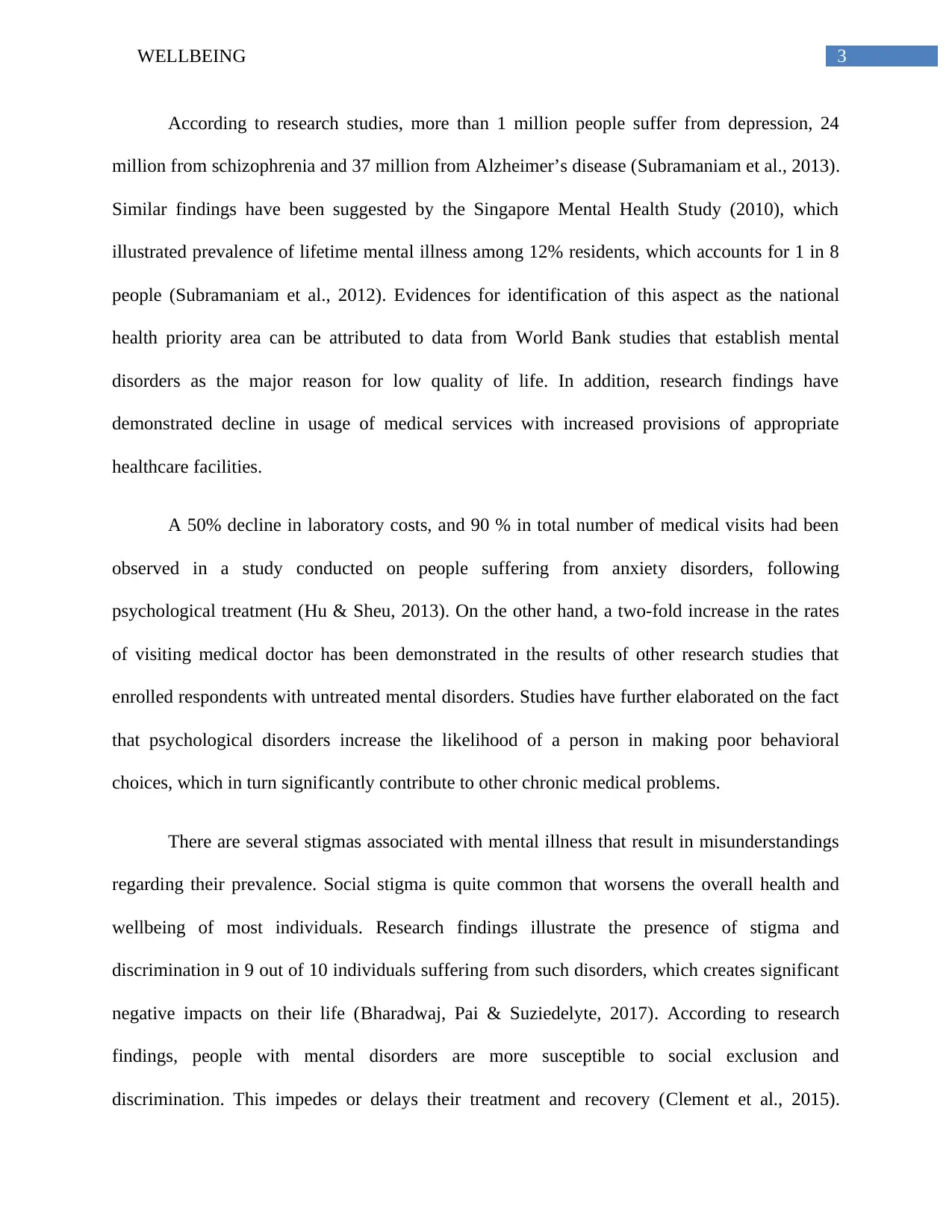
3WELLBEING
According to research studies, more than 1 million people suffer from depression, 24
million from schizophrenia and 37 million from Alzheimer’s disease (Subramaniam et al., 2013).
Similar findings have been suggested by the Singapore Mental Health Study (2010), which
illustrated prevalence of lifetime mental illness among 12% residents, which accounts for 1 in 8
people (Subramaniam et al., 2012). Evidences for identification of this aspect as the national
health priority area can be attributed to data from World Bank studies that establish mental
disorders as the major reason for low quality of life. In addition, research findings have
demonstrated decline in usage of medical services with increased provisions of appropriate
healthcare facilities.
A 50% decline in laboratory costs, and 90 % in total number of medical visits had been
observed in a study conducted on people suffering from anxiety disorders, following
psychological treatment (Hu & Sheu, 2013). On the other hand, a two-fold increase in the rates
of visiting medical doctor has been demonstrated in the results of other research studies that
enrolled respondents with untreated mental disorders. Studies have further elaborated on the fact
that psychological disorders increase the likelihood of a person in making poor behavioral
choices, which in turn significantly contribute to other chronic medical problems.
There are several stigmas associated with mental illness that result in misunderstandings
regarding their prevalence. Social stigma is quite common that worsens the overall health and
wellbeing of most individuals. Research findings illustrate the presence of stigma and
discrimination in 9 out of 10 individuals suffering from such disorders, which creates significant
negative impacts on their life (Bharadwaj, Pai & Suziedelyte, 2017). According to research
findings, people with mental disorders are more susceptible to social exclusion and
discrimination. This impedes or delays their treatment and recovery (Clement et al., 2015).
According to research studies, more than 1 million people suffer from depression, 24
million from schizophrenia and 37 million from Alzheimer’s disease (Subramaniam et al., 2013).
Similar findings have been suggested by the Singapore Mental Health Study (2010), which
illustrated prevalence of lifetime mental illness among 12% residents, which accounts for 1 in 8
people (Subramaniam et al., 2012). Evidences for identification of this aspect as the national
health priority area can be attributed to data from World Bank studies that establish mental
disorders as the major reason for low quality of life. In addition, research findings have
demonstrated decline in usage of medical services with increased provisions of appropriate
healthcare facilities.
A 50% decline in laboratory costs, and 90 % in total number of medical visits had been
observed in a study conducted on people suffering from anxiety disorders, following
psychological treatment (Hu & Sheu, 2013). On the other hand, a two-fold increase in the rates
of visiting medical doctor has been demonstrated in the results of other research studies that
enrolled respondents with untreated mental disorders. Studies have further elaborated on the fact
that psychological disorders increase the likelihood of a person in making poor behavioral
choices, which in turn significantly contribute to other chronic medical problems.
There are several stigmas associated with mental illness that result in misunderstandings
regarding their prevalence. Social stigma is quite common that worsens the overall health and
wellbeing of most individuals. Research findings illustrate the presence of stigma and
discrimination in 9 out of 10 individuals suffering from such disorders, which creates significant
negative impacts on their life (Bharadwaj, Pai & Suziedelyte, 2017). According to research
findings, people with mental disorders are more susceptible to social exclusion and
discrimination. This impedes or delays their treatment and recovery (Clement et al., 2015).
Paraphrase This Document
Need a fresh take? Get an instant paraphrase of this document with our AI Paraphraser
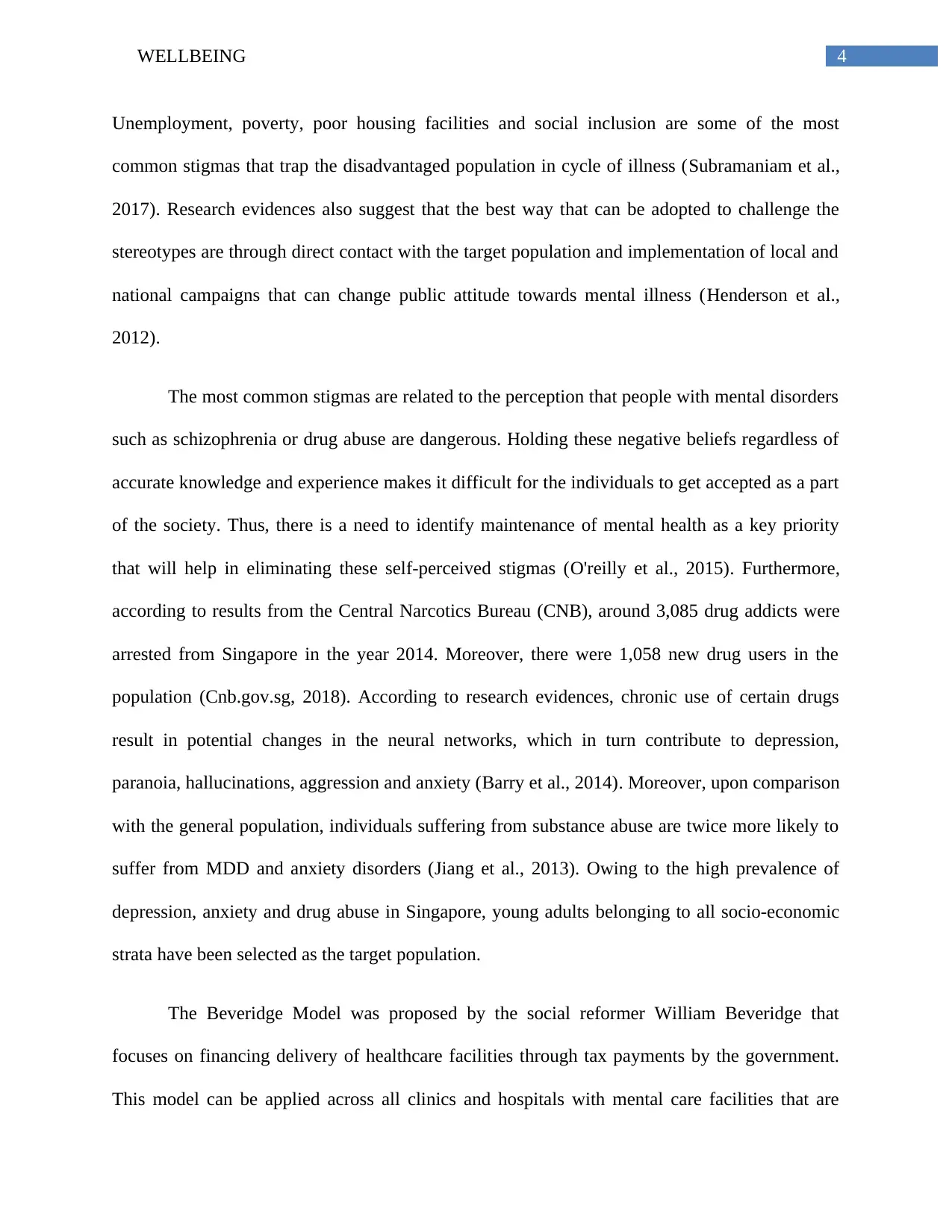
4WELLBEING
Unemployment, poverty, poor housing facilities and social inclusion are some of the most
common stigmas that trap the disadvantaged population in cycle of illness (Subramaniam et al.,
2017). Research evidences also suggest that the best way that can be adopted to challenge the
stereotypes are through direct contact with the target population and implementation of local and
national campaigns that can change public attitude towards mental illness (Henderson et al.,
2012).
The most common stigmas are related to the perception that people with mental disorders
such as schizophrenia or drug abuse are dangerous. Holding these negative beliefs regardless of
accurate knowledge and experience makes it difficult for the individuals to get accepted as a part
of the society. Thus, there is a need to identify maintenance of mental health as a key priority
that will help in eliminating these self-perceived stigmas (O'reilly et al., 2015). Furthermore,
according to results from the Central Narcotics Bureau (CNB), around 3,085 drug addicts were
arrested from Singapore in the year 2014. Moreover, there were 1,058 new drug users in the
population (Cnb.gov.sg, 2018). According to research evidences, chronic use of certain drugs
result in potential changes in the neural networks, which in turn contribute to depression,
paranoia, hallucinations, aggression and anxiety (Barry et al., 2014). Moreover, upon comparison
with the general population, individuals suffering from substance abuse are twice more likely to
suffer from MDD and anxiety disorders (Jiang et al., 2013). Owing to the high prevalence of
depression, anxiety and drug abuse in Singapore, young adults belonging to all socio-economic
strata have been selected as the target population.
The Beveridge Model was proposed by the social reformer William Beveridge that
focuses on financing delivery of healthcare facilities through tax payments by the government.
This model can be applied across all clinics and hospitals with mental care facilities that are
Unemployment, poverty, poor housing facilities and social inclusion are some of the most
common stigmas that trap the disadvantaged population in cycle of illness (Subramaniam et al.,
2017). Research evidences also suggest that the best way that can be adopted to challenge the
stereotypes are through direct contact with the target population and implementation of local and
national campaigns that can change public attitude towards mental illness (Henderson et al.,
2012).
The most common stigmas are related to the perception that people with mental disorders
such as schizophrenia or drug abuse are dangerous. Holding these negative beliefs regardless of
accurate knowledge and experience makes it difficult for the individuals to get accepted as a part
of the society. Thus, there is a need to identify maintenance of mental health as a key priority
that will help in eliminating these self-perceived stigmas (O'reilly et al., 2015). Furthermore,
according to results from the Central Narcotics Bureau (CNB), around 3,085 drug addicts were
arrested from Singapore in the year 2014. Moreover, there were 1,058 new drug users in the
population (Cnb.gov.sg, 2018). According to research evidences, chronic use of certain drugs
result in potential changes in the neural networks, which in turn contribute to depression,
paranoia, hallucinations, aggression and anxiety (Barry et al., 2014). Moreover, upon comparison
with the general population, individuals suffering from substance abuse are twice more likely to
suffer from MDD and anxiety disorders (Jiang et al., 2013). Owing to the high prevalence of
depression, anxiety and drug abuse in Singapore, young adults belonging to all socio-economic
strata have been selected as the target population.
The Beveridge Model was proposed by the social reformer William Beveridge that
focuses on financing delivery of healthcare facilities through tax payments by the government.
This model can be applied across all clinics and hospitals with mental care facilities that are
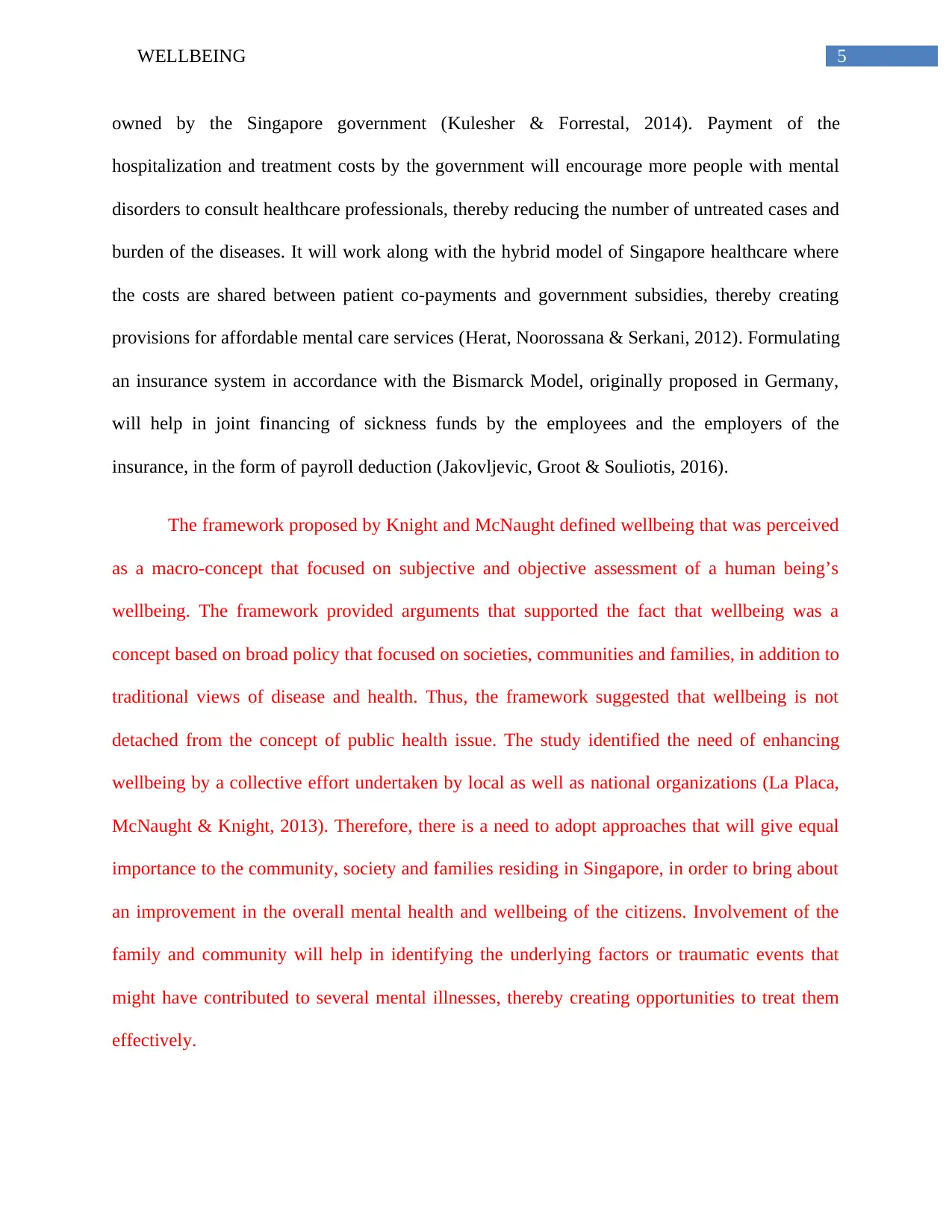
5WELLBEING
owned by the Singapore government (Kulesher & Forrestal, 2014). Payment of the
hospitalization and treatment costs by the government will encourage more people with mental
disorders to consult healthcare professionals, thereby reducing the number of untreated cases and
burden of the diseases. It will work along with the hybrid model of Singapore healthcare where
the costs are shared between patient co-payments and government subsidies, thereby creating
provisions for affordable mental care services (Herat, Noorossana & Serkani, 2012). Formulating
an insurance system in accordance with the Bismarck Model, originally proposed in Germany,
will help in joint financing of sickness funds by the employees and the employers of the
insurance, in the form of payroll deduction (Jakovljevic, Groot & Souliotis, 2016).
The framework proposed by Knight and McNaught defined wellbeing that was perceived
as a macro-concept that focused on subjective and objective assessment of a human being’s
wellbeing. The framework provided arguments that supported the fact that wellbeing was a
concept based on broad policy that focused on societies, communities and families, in addition to
traditional views of disease and health. Thus, the framework suggested that wellbeing is not
detached from the concept of public health issue. The study identified the need of enhancing
wellbeing by a collective effort undertaken by local as well as national organizations (La Placa,
McNaught & Knight, 2013). Therefore, there is a need to adopt approaches that will give equal
importance to the community, society and families residing in Singapore, in order to bring about
an improvement in the overall mental health and wellbeing of the citizens. Involvement of the
family and community will help in identifying the underlying factors or traumatic events that
might have contributed to several mental illnesses, thereby creating opportunities to treat them
effectively.
owned by the Singapore government (Kulesher & Forrestal, 2014). Payment of the
hospitalization and treatment costs by the government will encourage more people with mental
disorders to consult healthcare professionals, thereby reducing the number of untreated cases and
burden of the diseases. It will work along with the hybrid model of Singapore healthcare where
the costs are shared between patient co-payments and government subsidies, thereby creating
provisions for affordable mental care services (Herat, Noorossana & Serkani, 2012). Formulating
an insurance system in accordance with the Bismarck Model, originally proposed in Germany,
will help in joint financing of sickness funds by the employees and the employers of the
insurance, in the form of payroll deduction (Jakovljevic, Groot & Souliotis, 2016).
The framework proposed by Knight and McNaught defined wellbeing that was perceived
as a macro-concept that focused on subjective and objective assessment of a human being’s
wellbeing. The framework provided arguments that supported the fact that wellbeing was a
concept based on broad policy that focused on societies, communities and families, in addition to
traditional views of disease and health. Thus, the framework suggested that wellbeing is not
detached from the concept of public health issue. The study identified the need of enhancing
wellbeing by a collective effort undertaken by local as well as national organizations (La Placa,
McNaught & Knight, 2013). Therefore, there is a need to adopt approaches that will give equal
importance to the community, society and families residing in Singapore, in order to bring about
an improvement in the overall mental health and wellbeing of the citizens. Involvement of the
family and community will help in identifying the underlying factors or traumatic events that
might have contributed to several mental illnesses, thereby creating opportunities to treat them
effectively.
⊘ This is a preview!⊘
Do you want full access?
Subscribe today to unlock all pages.

Trusted by 1+ million students worldwide
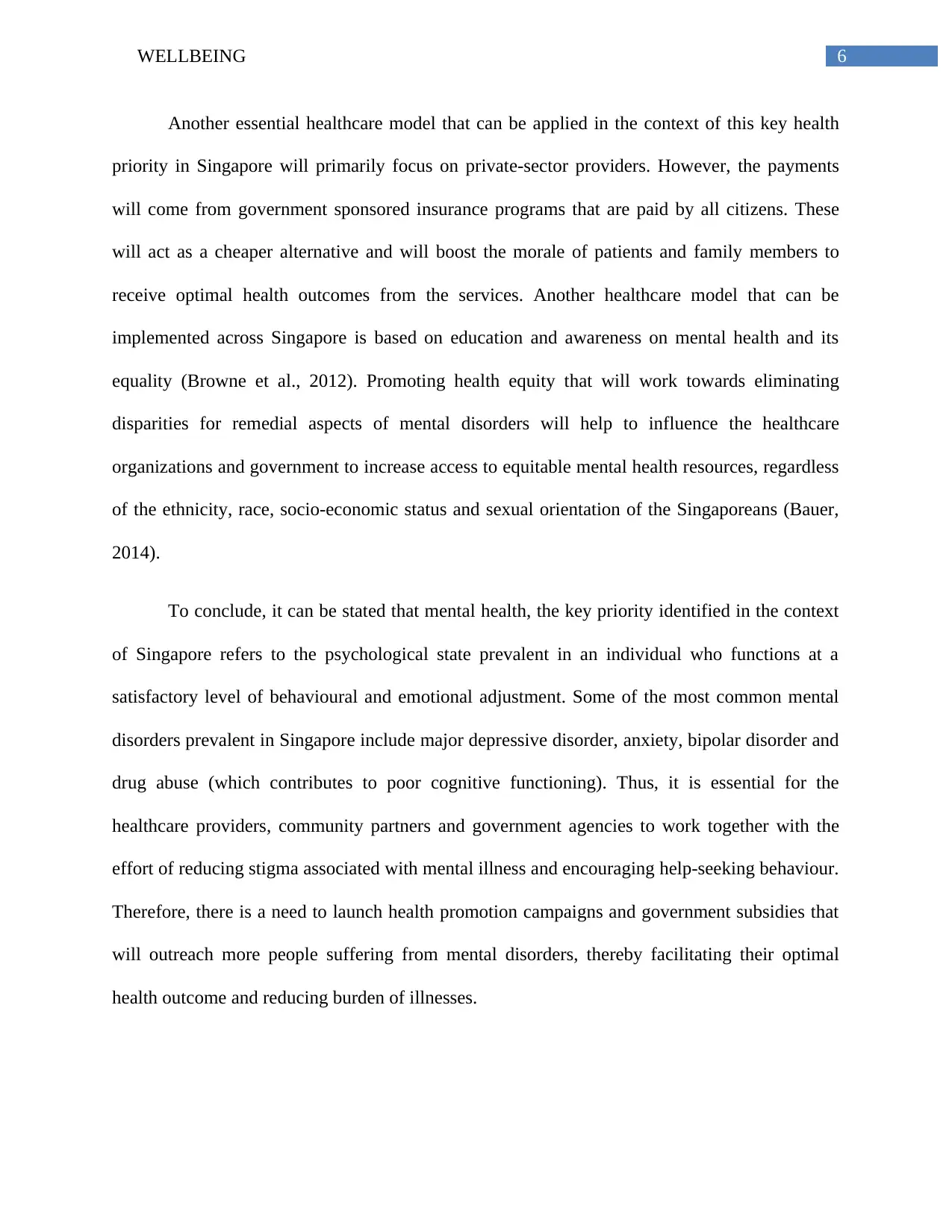
6WELLBEING
Another essential healthcare model that can be applied in the context of this key health
priority in Singapore will primarily focus on private-sector providers. However, the payments
will come from government sponsored insurance programs that are paid by all citizens. These
will act as a cheaper alternative and will boost the morale of patients and family members to
receive optimal health outcomes from the services. Another healthcare model that can be
implemented across Singapore is based on education and awareness on mental health and its
equality (Browne et al., 2012). Promoting health equity that will work towards eliminating
disparities for remedial aspects of mental disorders will help to influence the healthcare
organizations and government to increase access to equitable mental health resources, regardless
of the ethnicity, race, socio-economic status and sexual orientation of the Singaporeans (Bauer,
2014).
To conclude, it can be stated that mental health, the key priority identified in the context
of Singapore refers to the psychological state prevalent in an individual who functions at a
satisfactory level of behavioural and emotional adjustment. Some of the most common mental
disorders prevalent in Singapore include major depressive disorder, anxiety, bipolar disorder and
drug abuse (which contributes to poor cognitive functioning). Thus, it is essential for the
healthcare providers, community partners and government agencies to work together with the
effort of reducing stigma associated with mental illness and encouraging help-seeking behaviour.
Therefore, there is a need to launch health promotion campaigns and government subsidies that
will outreach more people suffering from mental disorders, thereby facilitating their optimal
health outcome and reducing burden of illnesses.
Another essential healthcare model that can be applied in the context of this key health
priority in Singapore will primarily focus on private-sector providers. However, the payments
will come from government sponsored insurance programs that are paid by all citizens. These
will act as a cheaper alternative and will boost the morale of patients and family members to
receive optimal health outcomes from the services. Another healthcare model that can be
implemented across Singapore is based on education and awareness on mental health and its
equality (Browne et al., 2012). Promoting health equity that will work towards eliminating
disparities for remedial aspects of mental disorders will help to influence the healthcare
organizations and government to increase access to equitable mental health resources, regardless
of the ethnicity, race, socio-economic status and sexual orientation of the Singaporeans (Bauer,
2014).
To conclude, it can be stated that mental health, the key priority identified in the context
of Singapore refers to the psychological state prevalent in an individual who functions at a
satisfactory level of behavioural and emotional adjustment. Some of the most common mental
disorders prevalent in Singapore include major depressive disorder, anxiety, bipolar disorder and
drug abuse (which contributes to poor cognitive functioning). Thus, it is essential for the
healthcare providers, community partners and government agencies to work together with the
effort of reducing stigma associated with mental illness and encouraging help-seeking behaviour.
Therefore, there is a need to launch health promotion campaigns and government subsidies that
will outreach more people suffering from mental disorders, thereby facilitating their optimal
health outcome and reducing burden of illnesses.
Paraphrase This Document
Need a fresh take? Get an instant paraphrase of this document with our AI Paraphraser

7WELLBEING
References
Anikeeva, O., Bi, P., Hiller, J. E., Ryan, P., Roder, D., & Han, G. S. (2015). Trends in migrant
mortality rates in Australia 1981–2007: a focus on the National Health Priority Areas
other than cancer. Ethnicity & health, 20(1), 29-48.
Barry, C. L., McGinty, E. E., Pescosolido, B. A., & Goldman, H. H. (2014). Stigma,
discrimination, treatment effectiveness, and policy: public views about drug addiction
and mental illness. Psychiatric Services, 65(10), 1269-1272.
Bauer, G. R. (2014). Incorporating intersectionality theory into population health research
methodology: Challenges and the potential to advance health equity. Social science &
medicine, 110, 10-17.
Bharadwaj, P., Pai, M. M., & Suziedelyte, A. (2017). Mental health stigma. Economics
Letters, 159, 57-60.
Browne, A. J., Varcoe, C. M., Wong, S. T., Smye, V. L., Lavoie, J., Littlejohn, D., ... & Fridkin,
A. (2012). Closing the health equity gap: evidence-based strategies for primary health
care organizations. International Journal for Equity in Health, 11(1), 59.
Clement, S., Schauman, O., Graham, T., Maggioni, F., Evans-Lacko, S., Bezborodovs, N., ... &
Thornicroft, G. (2015). What is the impact of mental health-related stigma on help-
seeking? A systematic review of quantitative and qualitative studies. Psychological
medicine, 45(1), 11-27.
References
Anikeeva, O., Bi, P., Hiller, J. E., Ryan, P., Roder, D., & Han, G. S. (2015). Trends in migrant
mortality rates in Australia 1981–2007: a focus on the National Health Priority Areas
other than cancer. Ethnicity & health, 20(1), 29-48.
Barry, C. L., McGinty, E. E., Pescosolido, B. A., & Goldman, H. H. (2014). Stigma,
discrimination, treatment effectiveness, and policy: public views about drug addiction
and mental illness. Psychiatric Services, 65(10), 1269-1272.
Bauer, G. R. (2014). Incorporating intersectionality theory into population health research
methodology: Challenges and the potential to advance health equity. Social science &
medicine, 110, 10-17.
Bharadwaj, P., Pai, M. M., & Suziedelyte, A. (2017). Mental health stigma. Economics
Letters, 159, 57-60.
Browne, A. J., Varcoe, C. M., Wong, S. T., Smye, V. L., Lavoie, J., Littlejohn, D., ... & Fridkin,
A. (2012). Closing the health equity gap: evidence-based strategies for primary health
care organizations. International Journal for Equity in Health, 11(1), 59.
Clement, S., Schauman, O., Graham, T., Maggioni, F., Evans-Lacko, S., Bezborodovs, N., ... &
Thornicroft, G. (2015). What is the impact of mental health-related stigma on help-
seeking? A systematic review of quantitative and qualitative studies. Psychological
medicine, 45(1), 11-27.
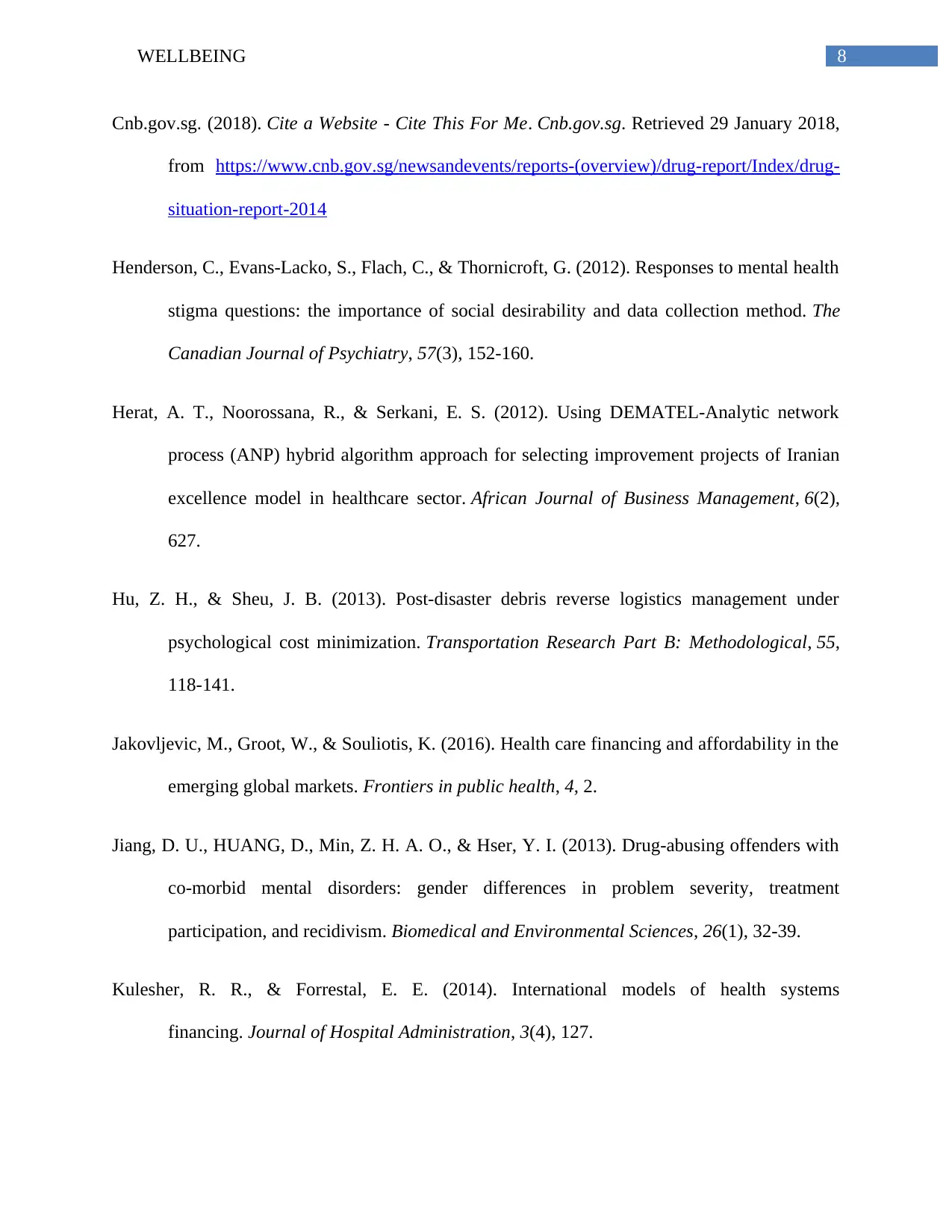
8WELLBEING
Cnb.gov.sg. (2018). Cite a Website - Cite This For Me. Cnb.gov.sg. Retrieved 29 January 2018,
from https://www.cnb.gov.sg/newsandevents/reports-(overview)/drug-report/Index/drug-
situation-report-2014
Henderson, C., Evans-Lacko, S., Flach, C., & Thornicroft, G. (2012). Responses to mental health
stigma questions: the importance of social desirability and data collection method. The
Canadian Journal of Psychiatry, 57(3), 152-160.
Herat, A. T., Noorossana, R., & Serkani, E. S. (2012). Using DEMATEL-Analytic network
process (ANP) hybrid algorithm approach for selecting improvement projects of Iranian
excellence model in healthcare sector. African Journal of Business Management, 6(2),
627.
Hu, Z. H., & Sheu, J. B. (2013). Post-disaster debris reverse logistics management under
psychological cost minimization. Transportation Research Part B: Methodological, 55,
118-141.
Jakovljevic, M., Groot, W., & Souliotis, K. (2016). Health care financing and affordability in the
emerging global markets. Frontiers in public health, 4, 2.
Jiang, D. U., HUANG, D., Min, Z. H. A. O., & Hser, Y. I. (2013). Drug-abusing offenders with
co-morbid mental disorders: gender differences in problem severity, treatment
participation, and recidivism. Biomedical and Environmental Sciences, 26(1), 32-39.
Kulesher, R. R., & Forrestal, E. E. (2014). International models of health systems
financing. Journal of Hospital Administration, 3(4), 127.
Cnb.gov.sg. (2018). Cite a Website - Cite This For Me. Cnb.gov.sg. Retrieved 29 January 2018,
from https://www.cnb.gov.sg/newsandevents/reports-(overview)/drug-report/Index/drug-
situation-report-2014
Henderson, C., Evans-Lacko, S., Flach, C., & Thornicroft, G. (2012). Responses to mental health
stigma questions: the importance of social desirability and data collection method. The
Canadian Journal of Psychiatry, 57(3), 152-160.
Herat, A. T., Noorossana, R., & Serkani, E. S. (2012). Using DEMATEL-Analytic network
process (ANP) hybrid algorithm approach for selecting improvement projects of Iranian
excellence model in healthcare sector. African Journal of Business Management, 6(2),
627.
Hu, Z. H., & Sheu, J. B. (2013). Post-disaster debris reverse logistics management under
psychological cost minimization. Transportation Research Part B: Methodological, 55,
118-141.
Jakovljevic, M., Groot, W., & Souliotis, K. (2016). Health care financing and affordability in the
emerging global markets. Frontiers in public health, 4, 2.
Jiang, D. U., HUANG, D., Min, Z. H. A. O., & Hser, Y. I. (2013). Drug-abusing offenders with
co-morbid mental disorders: gender differences in problem severity, treatment
participation, and recidivism. Biomedical and Environmental Sciences, 26(1), 32-39.
Kulesher, R. R., & Forrestal, E. E. (2014). International models of health systems
financing. Journal of Hospital Administration, 3(4), 127.
⊘ This is a preview!⊘
Do you want full access?
Subscribe today to unlock all pages.

Trusted by 1+ million students worldwide
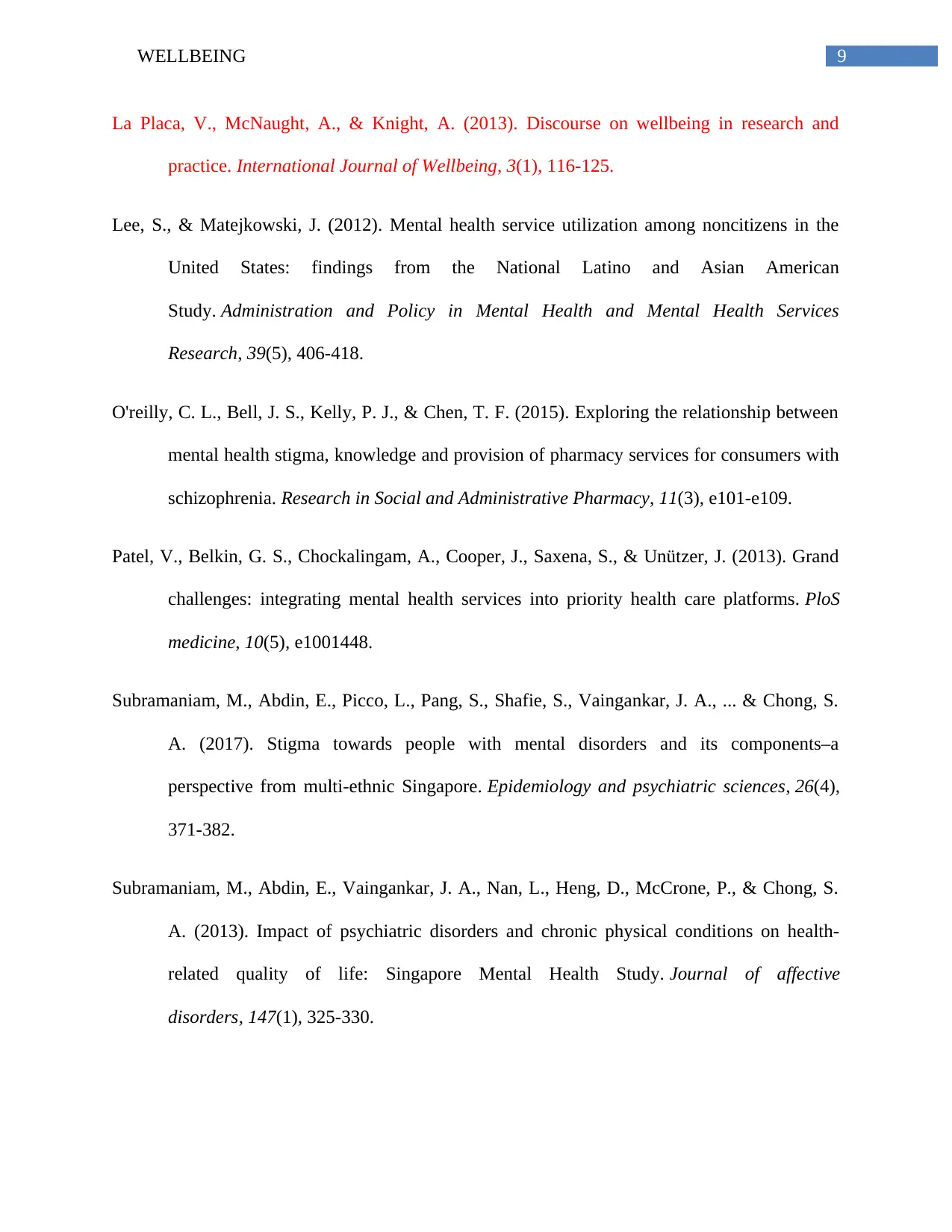
9WELLBEING
La Placa, V., McNaught, A., & Knight, A. (2013). Discourse on wellbeing in research and
practice. International Journal of Wellbeing, 3(1), 116-125.
Lee, S., & Matejkowski, J. (2012). Mental health service utilization among noncitizens in the
United States: findings from the National Latino and Asian American
Study. Administration and Policy in Mental Health and Mental Health Services
Research, 39(5), 406-418.
O'reilly, C. L., Bell, J. S., Kelly, P. J., & Chen, T. F. (2015). Exploring the relationship between
mental health stigma, knowledge and provision of pharmacy services for consumers with
schizophrenia. Research in Social and Administrative Pharmacy, 11(3), e101-e109.
Patel, V., Belkin, G. S., Chockalingam, A., Cooper, J., Saxena, S., & Unützer, J. (2013). Grand
challenges: integrating mental health services into priority health care platforms. PloS
medicine, 10(5), e1001448.
Subramaniam, M., Abdin, E., Picco, L., Pang, S., Shafie, S., Vaingankar, J. A., ... & Chong, S.
A. (2017). Stigma towards people with mental disorders and its components–a
perspective from multi-ethnic Singapore. Epidemiology and psychiatric sciences, 26(4),
371-382.
Subramaniam, M., Abdin, E., Vaingankar, J. A., Nan, L., Heng, D., McCrone, P., & Chong, S.
A. (2013). Impact of psychiatric disorders and chronic physical conditions on health-
related quality of life: Singapore Mental Health Study. Journal of affective
disorders, 147(1), 325-330.
La Placa, V., McNaught, A., & Knight, A. (2013). Discourse on wellbeing in research and
practice. International Journal of Wellbeing, 3(1), 116-125.
Lee, S., & Matejkowski, J. (2012). Mental health service utilization among noncitizens in the
United States: findings from the National Latino and Asian American
Study. Administration and Policy in Mental Health and Mental Health Services
Research, 39(5), 406-418.
O'reilly, C. L., Bell, J. S., Kelly, P. J., & Chen, T. F. (2015). Exploring the relationship between
mental health stigma, knowledge and provision of pharmacy services for consumers with
schizophrenia. Research in Social and Administrative Pharmacy, 11(3), e101-e109.
Patel, V., Belkin, G. S., Chockalingam, A., Cooper, J., Saxena, S., & Unützer, J. (2013). Grand
challenges: integrating mental health services into priority health care platforms. PloS
medicine, 10(5), e1001448.
Subramaniam, M., Abdin, E., Picco, L., Pang, S., Shafie, S., Vaingankar, J. A., ... & Chong, S.
A. (2017). Stigma towards people with mental disorders and its components–a
perspective from multi-ethnic Singapore. Epidemiology and psychiatric sciences, 26(4),
371-382.
Subramaniam, M., Abdin, E., Vaingankar, J. A., Nan, L., Heng, D., McCrone, P., & Chong, S.
A. (2013). Impact of psychiatric disorders and chronic physical conditions on health-
related quality of life: Singapore Mental Health Study. Journal of affective
disorders, 147(1), 325-330.
Paraphrase This Document
Need a fresh take? Get an instant paraphrase of this document with our AI Paraphraser
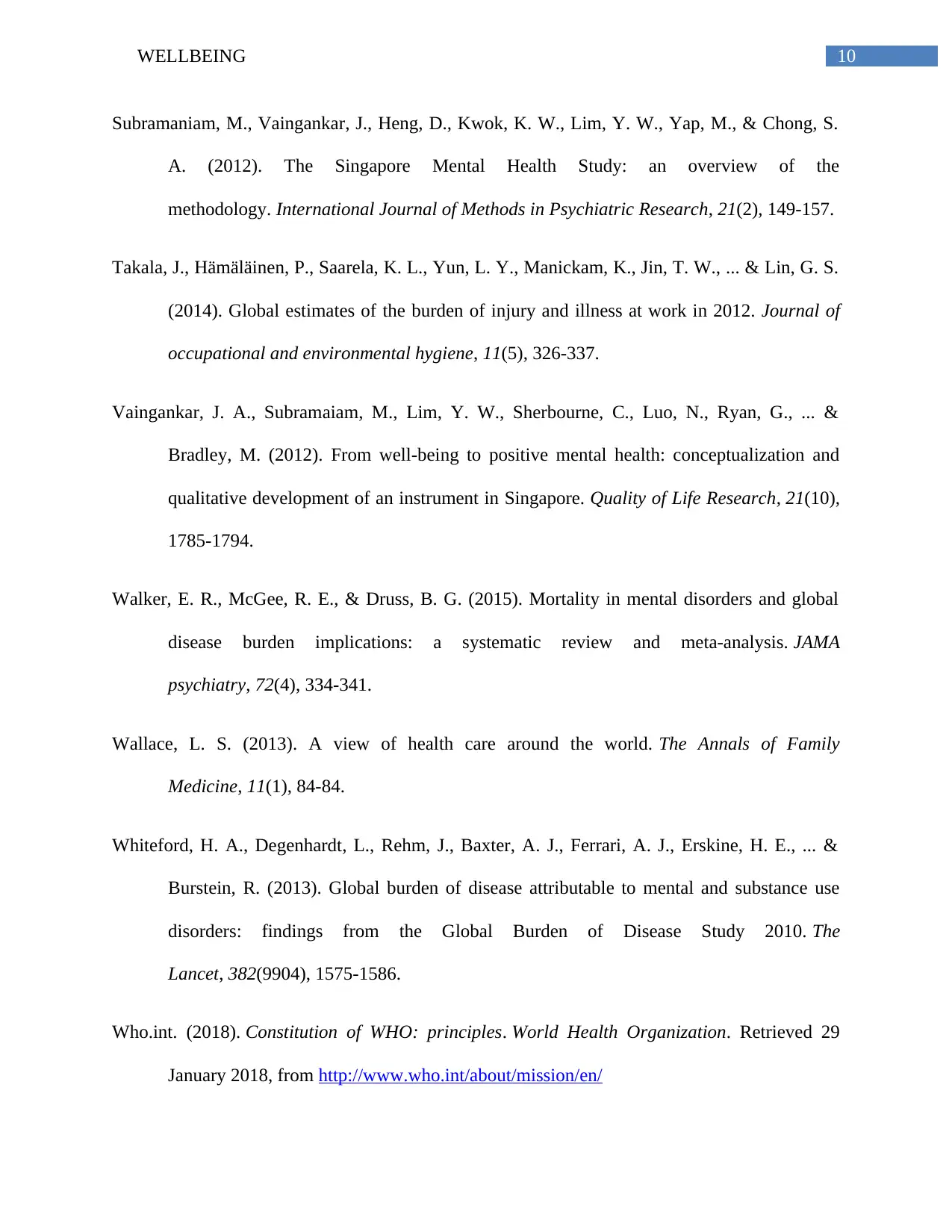
10WELLBEING
Subramaniam, M., Vaingankar, J., Heng, D., Kwok, K. W., Lim, Y. W., Yap, M., & Chong, S.
A. (2012). The Singapore Mental Health Study: an overview of the
methodology. International Journal of Methods in Psychiatric Research, 21(2), 149-157.
Takala, J., Hämäläinen, P., Saarela, K. L., Yun, L. Y., Manickam, K., Jin, T. W., ... & Lin, G. S.
(2014). Global estimates of the burden of injury and illness at work in 2012. Journal of
occupational and environmental hygiene, 11(5), 326-337.
Vaingankar, J. A., Subramaiam, M., Lim, Y. W., Sherbourne, C., Luo, N., Ryan, G., ... &
Bradley, M. (2012). From well-being to positive mental health: conceptualization and
qualitative development of an instrument in Singapore. Quality of Life Research, 21(10),
1785-1794.
Walker, E. R., McGee, R. E., & Druss, B. G. (2015). Mortality in mental disorders and global
disease burden implications: a systematic review and meta-analysis. JAMA
psychiatry, 72(4), 334-341.
Wallace, L. S. (2013). A view of health care around the world. The Annals of Family
Medicine, 11(1), 84-84.
Whiteford, H. A., Degenhardt, L., Rehm, J., Baxter, A. J., Ferrari, A. J., Erskine, H. E., ... &
Burstein, R. (2013). Global burden of disease attributable to mental and substance use
disorders: findings from the Global Burden of Disease Study 2010. The
Lancet, 382(9904), 1575-1586.
Who.int. (2018). Constitution of WHO: principles. World Health Organization. Retrieved 29
January 2018, from http://www.who.int/about/mission/en/
Subramaniam, M., Vaingankar, J., Heng, D., Kwok, K. W., Lim, Y. W., Yap, M., & Chong, S.
A. (2012). The Singapore Mental Health Study: an overview of the
methodology. International Journal of Methods in Psychiatric Research, 21(2), 149-157.
Takala, J., Hämäläinen, P., Saarela, K. L., Yun, L. Y., Manickam, K., Jin, T. W., ... & Lin, G. S.
(2014). Global estimates of the burden of injury and illness at work in 2012. Journal of
occupational and environmental hygiene, 11(5), 326-337.
Vaingankar, J. A., Subramaiam, M., Lim, Y. W., Sherbourne, C., Luo, N., Ryan, G., ... &
Bradley, M. (2012). From well-being to positive mental health: conceptualization and
qualitative development of an instrument in Singapore. Quality of Life Research, 21(10),
1785-1794.
Walker, E. R., McGee, R. E., & Druss, B. G. (2015). Mortality in mental disorders and global
disease burden implications: a systematic review and meta-analysis. JAMA
psychiatry, 72(4), 334-341.
Wallace, L. S. (2013). A view of health care around the world. The Annals of Family
Medicine, 11(1), 84-84.
Whiteford, H. A., Degenhardt, L., Rehm, J., Baxter, A. J., Ferrari, A. J., Erskine, H. E., ... &
Burstein, R. (2013). Global burden of disease attributable to mental and substance use
disorders: findings from the Global Burden of Disease Study 2010. The
Lancet, 382(9904), 1575-1586.
Who.int. (2018). Constitution of WHO: principles. World Health Organization. Retrieved 29
January 2018, from http://www.who.int/about/mission/en/

11WELLBEING
⊘ This is a preview!⊘
Do you want full access?
Subscribe today to unlock all pages.

Trusted by 1+ million students worldwide
1 out of 12
Related Documents
Your All-in-One AI-Powered Toolkit for Academic Success.
+13062052269
info@desklib.com
Available 24*7 on WhatsApp / Email
![[object Object]](/_next/static/media/star-bottom.7253800d.svg)
Unlock your academic potential
Copyright © 2020–2026 A2Z Services. All Rights Reserved. Developed and managed by ZUCOL.





